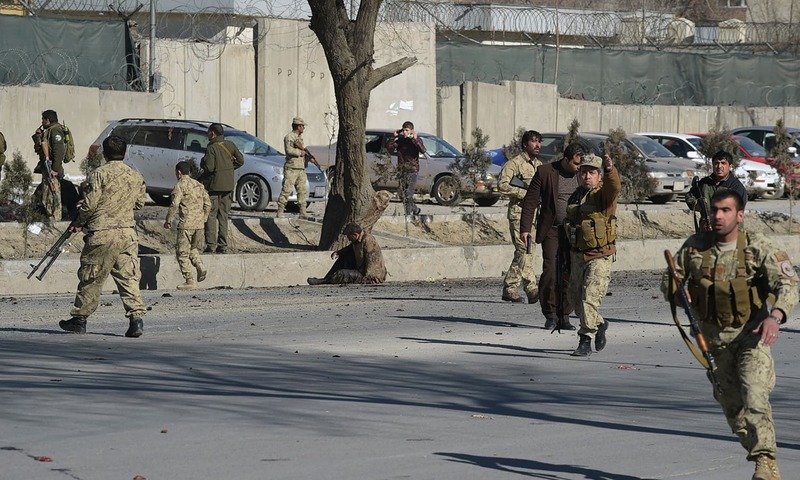Blasts, gunfire as militants attack Indian consulate in Afghan city

JALALABAD: Explosions and gunfire echoed Wednesday as militants attacked the Indian consulate in Jalalabad in the latest assault to rattle the eastern Afghan city.
As gunfire rang out, security forces in armoured vehicles were seen moving to the scene while civilians fled.
No militant group has so far claimed responsibility for the ongoing assault and no fatalities were immediately reported.
Indian foreign ministry spokesman Vikas Swarup told media: “Our consulate has been targeted but everyone is safe.”
A shopkeeper near the consulate told media he saw several injured people lying around the area after a “big boom” shattered his windows.
The area, also home to other diplomatic missions, has repeatedly come under attack in recent months.
In January, the militant Islamic State (IS) group claimed responsibility for a deadly gun and bomb siege targeting the nearby Pakistani consulate in Jalalabad, the first major attack by the group in an Afghan city.
Nangarhar, of which Jalalabad is the capital, faces an emerging threat from loyalists of IS group, which controls territory across Syria and Iraq and is making gradual inroads in Afghanistan — challenging the Taliban on their own turf.
The attack comes as direct peace talks are expected to start this week between the Afghan government and the Taliban.
US Army General John Campbell stepped down as commander of the NATO-led coalition in Afghanistan on Wednesday, capping an 18-month tenure that saw the alliance transition from regular combat to a training-focused mission as war continued to rage.
The incoming commander, General John Nicholson, will inherit a conflict that is testing Afghan security forces and the roughly 13,000 international troops who remain, with militants contesting or controlling as much as a third of Afghanistan.
Since Campbell took command of both coalition troops and US counterterrorism operations in August 2014, Taliban militants have made gains in several provinces, IS has established a nascent presence, and casualties have increased among both Afghan security forces and civilians.
Taliban gains, including their brief capture of the northern city of Kunduz last year, led Campbell to recommend keeping more American troops.
President Barack Obama abandoned plans in October to withdraw all U.S. forces, instead opting to leave thousands in Afghanistan at least until 2017.
Nicholson brings long experience in Afghanistan, having already spent three-and-a-half years deployed to some of the most contested areas.
In his first visit outside of Kabul since his arrival to assume his new command, Nicholson said he had travelled to Helmand province to try to reassure Afghan leaders there who have faced some of the most serious fighting.
Afghan and coalition leaders praised Campbell, a 41-year veteran of the US military, but the outgoing commander’s tenure was not without controversy.
Besides the deteriorating security situation, he faced sharp criticism over an American air strike on a Doctors Without Borders hospital in Kunduz in October that killed at least 42 medical staff, patients, and caretakers.
The full results of an investigation into the strike have yet to be released.
In January, India’s consulate in the northern Afghan city of Mazar-i-Sharif was also attacked by insurgents.
The explosion comes days after dozens of people were killed or wounded in suicide attacks in Kabul and the eastern province of Kunar, casting doubt on efforts to revive the stalled peace process with the Taliban.
Related News

Pakistan, Russia Sign Protocol to Revive Steel Mills
MOSCOW, JULY 11 (DNA):Pakistan and Russia have signed a Protocol to restore and modernize PakistanRead More

President urges communities’ role, inclusive policies to tackle population growth challenge
ISLAMABAD, Jul 10 (APP/DNA):****EMBARGOED TILL 2359 HRS TONIGHT* As the world observes World Population DayRead More


Comments are Closed